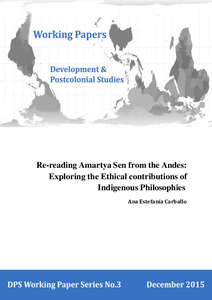Datum
2015Autor
Carballo, Ana EstefaníaSchlagwort
300 Sozialwissenschaften, Soziologie 320 Politikwissenschaft AndenIndigenes VolkSen, AmartyaWalsh, Catherine E.Lokales WissenBuen VivirMetadata
Zur Langanzeige
Working paper

Re-reading Amartya Sen from the Andes: Exploring the Ethical contributions of Indigenous Philosophies
Zusammenfassung
Over the last decade, the calls for Buen Vivir (BV)/ Sumak Kawsay (SK) that have emerged from the Andes have prompted a revival of interest in the indigenous philosophies of the region and their contributions to alternative development thinking. Both in academic and policy discussions, there is an emphasis on recovering Indigenous forms of knowledge to devise alternative paths to development. Yet, given the conceptual ambiguity of discussions of development, these efforts often appear to have ‘blended’ with more mainstream notions of development thinking, which are deeply ingrained in the region. This has been the case with the Human Development (HD) paradigm, built upon Amartya Sen’s theoretical work. The HD offers a people-centred understanding of development that has been widely embraced by international institutions and national governments and which does not simply equate to the concerns within the SK/BV framework. Yet, in policy documents and development initiatives the ideas of SK/BV and HD have been linked and their differences blurred. This conflation has resulted in the emergence of an ‘environmentally conscious’ idea of development that pervades most current policy initiatives, what Catherine Walsh calls the ‘HD paradogma’ (Walsh, 2010). This paper argues that rather than rushing into tracing their parallels and similarities, SK/BV gives us the opportunity to push further the boundaries of HD. While the ethical questions that will be raised in this paper cannot be exhausted in the present scope of discussion, its analysis will identify both contradictions and potential avenues that could and should be further considered if we are to achieve a fruitful engagement between the ideas of HD espoused by Amartya Sen and those emerging from the Indigenous philosophies of the Andes.
Zitieren
@unpublished{doi:10.17170/kobra-202311239067,
author={Carballo, Ana Estefanía},
title={Re-reading Amartya Sen from the Andes: Exploring the Ethical contributions of Indigenous Philosophies},
year={2015}
}
0500 Oax
0501 Text $btxt$2rdacontent
0502 Computermedien $bc$2rdacarrier
1100 2015$n2015
1500 1/eng
2050 ##0##http://hdl.handle.net/123456789/15217
3000 Carballo, Ana Estefanía
4000 Re-reading Amartya Sen from the Andes: Exploring the Ethical contributions of Indigenous Philosophies / Carballo, Ana Estefanía
4030
4060 Online-Ressource
4085 ##0##=u http://nbn-resolving.de/http://hdl.handle.net/123456789/15217=x R
4204 \$dWorking paper
4170
5550 {{Anden}}
5550 {{Indigenes Volk}}
5550 {{Sen, Amartya}}
5550 {{Walsh, Catherine E.}}
5550 {{Lokales Wissen}}
5550 {{Buen Vivir}}
7136 ##0##http://hdl.handle.net/123456789/15217
<resource xsi:schemaLocation="http://datacite.org/schema/kernel-2.2 http://schema.datacite.org/meta/kernel-2.2/metadata.xsd"> 2023-11-24T12:39:08Z 2023-11-24T12:39:08Z 2015 doi:10.17170/kobra-202311239067 http://hdl.handle.net/123456789/15217 eng Namensnennung - Weitergabe unter gleichen Bedingungen 4.0 International http://creativecommons.org/licenses/by-sa/4.0/ 300 320 Re-reading Amartya Sen from the Andes: Exploring the Ethical contributions of Indigenous Philosophies Working paper Over the last decade, the calls for Buen Vivir (BV)/ Sumak Kawsay (SK) that have emerged from the Andes have prompted a revival of interest in the indigenous philosophies of the region and their contributions to alternative development thinking. Both in academic and policy discussions, there is an emphasis on recovering Indigenous forms of knowledge to devise alternative paths to development. Yet, given the conceptual ambiguity of discussions of development, these efforts often appear to have ‘blended’ with more mainstream notions of development thinking, which are deeply ingrained in the region. This has been the case with the Human Development (HD) paradigm, built upon Amartya Sen’s theoretical work. The HD offers a people-centred understanding of development that has been widely embraced by international institutions and national governments and which does not simply equate to the concerns within the SK/BV framework. Yet, in policy documents and development initiatives the ideas of SK/BV and HD have been linked and their differences blurred. This conflation has resulted in the emergence of an ‘environmentally conscious’ idea of development that pervades most current policy initiatives, what Catherine Walsh calls the ‘HD paradogma’ (Walsh, 2010). This paper argues that rather than rushing into tracing their parallels and similarities, SK/BV gives us the opportunity to push further the boundaries of HD. While the ethical questions that will be raised in this paper cannot be exhausted in the present scope of discussion, its analysis will identify both contradictions and potential avenues that could and should be further considered if we are to achieve a fruitful engagement between the ideas of HD espoused by Amartya Sen and those emerging from the Indigenous philosophies of the Andes. open access Carballo, Ana Estefanía 34 Seiten Kassel, Universität Kassel, Fachbereich Gesellschaftswissenschaften Anden Indigenes Volk Sen, Amartya Walsh, Catherine E. Lokales Wissen Buen Vivir publishedVersion DPS Working Paper Series No. 3/2015 false true </resource>
Die folgenden Lizenzbestimmungen sind mit dieser Ressource verbunden:


